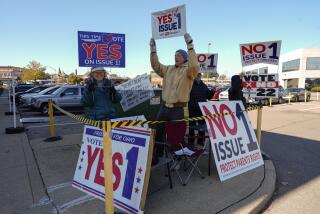Ohio Senate OKs Bill to Sell Home State Savings
- Share via
COLUMBUS, Ohio — The Ohio Senate reversed itself Tuesday, passing a previously defeated bill to allow the sale of the closed Home State Savings to Chemical New York. Gov. Richard F. Celeste quickly signed the measure into law.
About 500 of the thrift’s depositors, who have been unable to get their money since the institution closed in early March after a run on deposits, cheered as the Senate approved the House-passed measure on a 17-16 vote. The bill pumps up to $125.3 million in state money into the deal.
Chemical Chief Financial Officer Kenneth LaVine said he hoped to have Home State’s offices reopened--under the name Chemical Bank Ohio--during the week of June 10.
Home State’s 33 branches closed March 8 after nervous depositors withdrew more than $150 million from their accounts following the collapse of ESM Government Securities of Fort Lauderdale, Fla.
The sale measure passed when Sen. Donald Lukens, a Republican, changed his no vote of last week. He had favored an alternative to using public money in the sale but said he concluded over the weekend that no other plan could make it through the Legislature.
Although Chemical has submitted the only public buy-out proposal, Lukens said three other Ohio institutions and one in Pennsylvania were potential buyers.
The measure passed Tuesday provides that, in addition to Chemical, other institutions that want to buy Home State will have seven days to submit bids before the Chemical contract is final. The measure also authorizes Chase Manhattan Corp., which already has acquired two state-chartered thrifts, to buy four more savings institutions and turn them into commercial banks, which have broader lending power. And it places a two-year moratorium on Ohio expansions by Chemical and Chase, except through friendly takeovers approved by shareholders of the institutions to be acquired.
Under terms of the Home State deal, Chemical would pay a $21-million premium to enter the Ohio market and provide $30 million more to recapitalize the thrift. The state would sell bonds to raise $91.2 million that would be used to ensure that depositors receive 100% of their money.
In Maryland, Gov. Harry H. Hughes, responding to consumer complaints and suggestions from legislators, made it easier Tuesday for depositors to withdraw money from privately insured savings and loans. Hughes issued an executive order carving out significant exemptions to the $1,000 monthly limit on withdrawals that he imposed last week on about 1 million accounts in Maryland S&Ls.;
More to Read
Inside the business of entertainment
The Wide Shot brings you news, analysis and insights on everything from streaming wars to production — and what it all means for the future.
You may occasionally receive promotional content from the Los Angeles Times.










